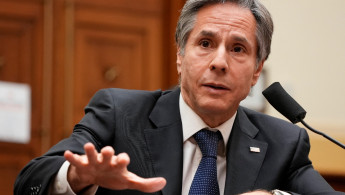Blinken says no Iran funds from South Korea before nuclear compliance
The United States suggested Wednesday it will oppose the release of billions of dollars in Iranian funds from South Korea until Tehran returns to full compliance with a nuclear deal.
South Korea said last month that it had agreed on a way forward to release the money frozen from Iran's oil sales but was awaiting the approval of the United States, which under President Joe Biden is looking at returning to a 2015 denuclearization deal.
"If Iran comes back into compliance with its obligations under the nuclear agreement, we would do the same thing," Secretary of State Antony Blinken told the House Foreign Affairs Committee when asked about the Iranian money in South Korea blocked by US sanctions.
"That would involve - if it came to that, if Iran made good on its obligations - sanctions relief pursuant to the agreement," he said.
"But unless and until Iran comes back into compliance, they won't be getting that relief."
Biden supports a return to diplomacy with Iran but insists that Tehran first return to full compliance with the 2015 deal by reversing nuclear steps it took to protest sanctions imposed by former president Donald Trump.
The Biden administration said on February 18 that it was willing to meet Iran under the auspices of the European Union but Tehran said the timing was not right, calling first for the removal of sanctions.
"We said we would attend. Iran so far has said no. I think the ball is in their court to see if they're serious about engaging or not," Blinken said.
The Biden administration's pointman on Iran, Rob Malley, said earlier that the United States would not rush to renew the nuclear deal before June elections that are expected to see the rise of a more hardline president.
"We don't intend to base the pace of our discussions on the Iranian elections - the pace will be determined by how far we can get, consistent with defending US national security interests," Malley said in an interview with Axios.
"In other words, we won't rush or slow things because of the Iranian elections."
A number of supporters of diplomacy with Iran have called for renewed efforts before the election and the exit of President Hassan Rouhani, who staked his legacy on the 2015 agreement.
Some experts, however, counter that Ayatollah Ali Khamenei ultimately calls the shots in Iran and that a new president would at most change the optics.





 Follow the Middle East's top stories in English at The New Arab on Google News
Follow the Middle East's top stories in English at The New Arab on Google News
![The UAE is widely suspected of arming the RSF militia [Getty]](/sites/default/files/styles/image_330x185/public/2024-11/GettyImages-472529908.jpg?h=69f2b9d0&itok=Yauw3YTG)
![Netanyahu furiously denounced the ICC [Getty]](/sites/default/files/styles/image_330x185/public/2024-11/GettyImages-2169352575.jpg?h=199d8c1f&itok=-vRiruf5)
![Both Hamas and the Palestinian Authority welcomed the ICC arrest warrants [Getty]](/sites/default/files/styles/image_330x185/public/2024-11/GettyImages-2178351173.jpg?h=199d8c1f&itok=TV858iVg)